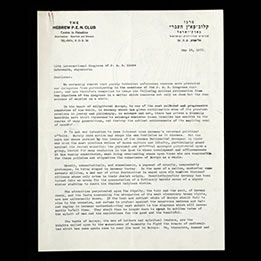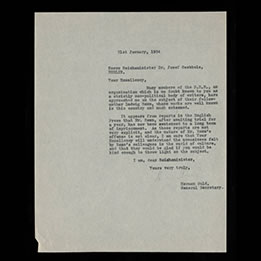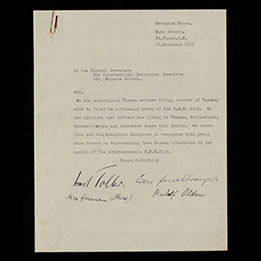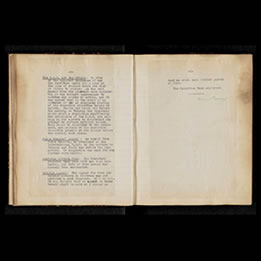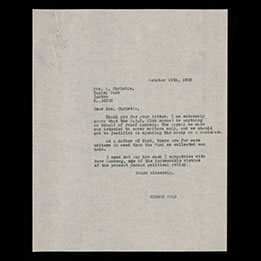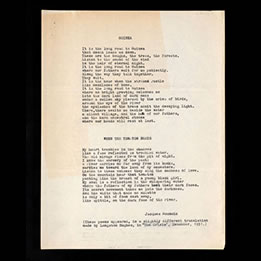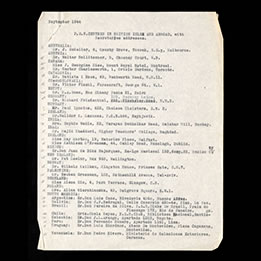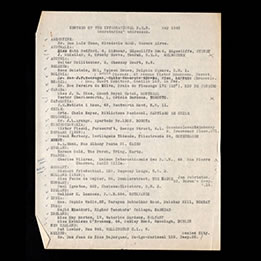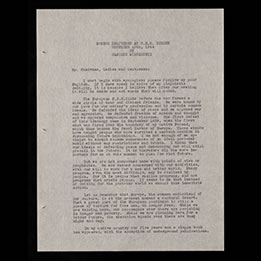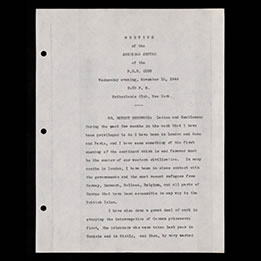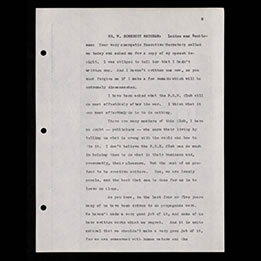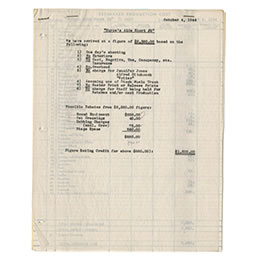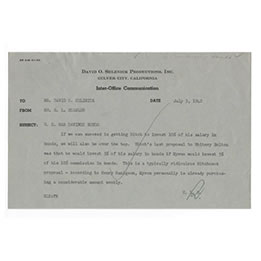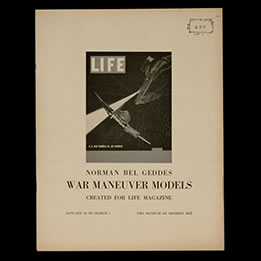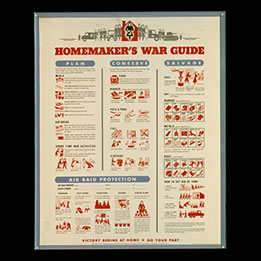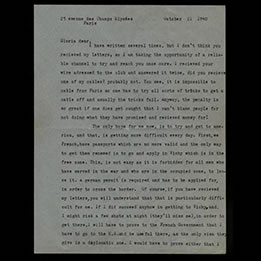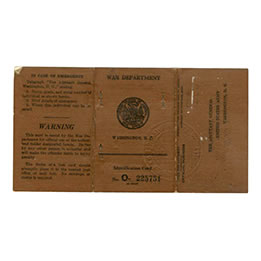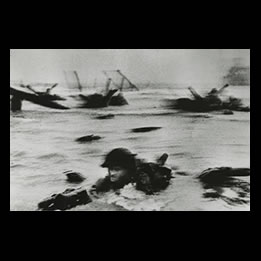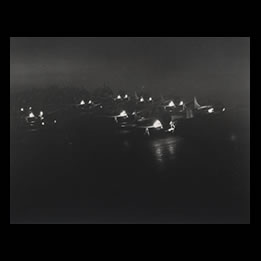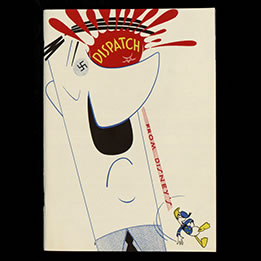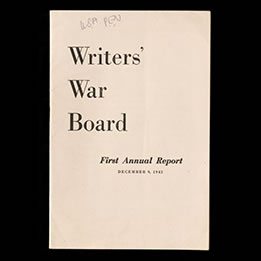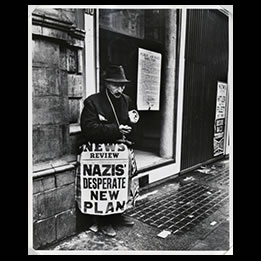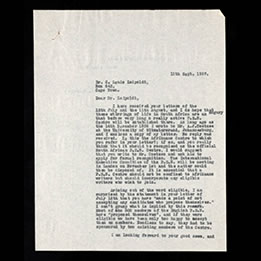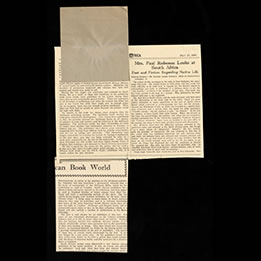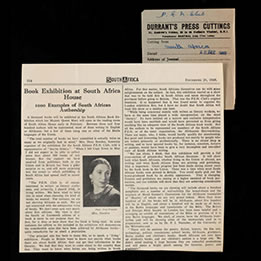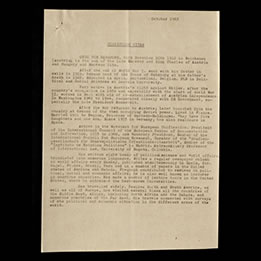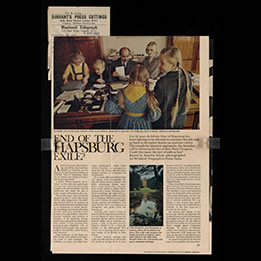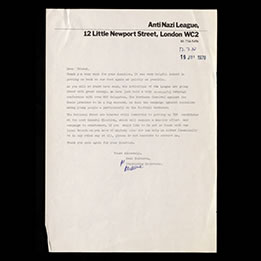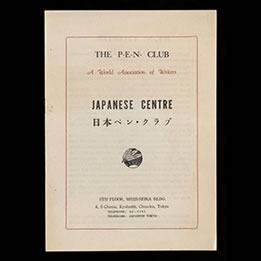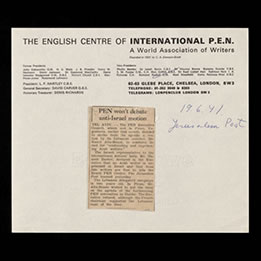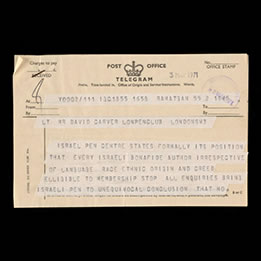International Human Rights
Writers and Free Speech
Writers in Exile / Global
Refugees
Writing the Cold War
Writing World War II
Digital Collections
Writing World War II
In an international war, military repercussions and the consequences of violence are inevitable. But world
war takes a toll in many other ways, affecting not only military and strategic targets, but also cultural and
creative leaders, thought leaders, artists, and ordinary citizens. As a relatively new international human
rights organization, less than 20 years old by this time, and struggling against its charter to remain
apolitical, PEN tried to intervene in a cultural struggle which grew as deadly as some military actions. From
1939 to 1945 as the war raged, PEN worked to secure asylum, to intervene on behalf of writers, to provide
supplies and eventually to participate in government sponsored efforts to fight fascism and totalitarianism.
As PEN tried to help writers across the globe, the organization was sometimes constrained by the legacies of
imperialism that helped to create it.
View Item
Letter from Isaac Lamdan of the Hebrew PEN Club in Palestine to the 11th
International Congress of PEN Clubs, Dubrovnik, Yugoslavia. May 19, 1933.
PEN Records 78.8
View Item
Draft of letter from Hermon Ould to Joseph Goebbels regarding the imprisonment of Ludwig Renn.
January 31, 1934.
PEN Records 20.1
View Item
Letter from Ernst Toller and three other German writers addressed to the PEN
International Secretary and Executive Committee. December 15, 1933.
PEN Records 70.1
View Item
English PEN Executive Committee Minutes segment "PEN and the Crisis." September 28, 1938.
PEN Records 235.6
View Item
Letter from Hermon Ould to Audrey Mildmay Christie. October 19, 1938.
PEN Records 10.5
View Item
Two poems by Haitian writer and activist Jacques Roumain. 1935.
PEN Records 77.2
View Item
List of PEN Centres in British Isles and Abroad. September 1944.
PEN Records 77.1
View Item
List of Centres of the International PEN. May 1945.
PEN Records 77.1
View Item
Speech delivered by Polish writer Kazimierz Wierzyński at the American PEN Center meeting. November
15, 1944.
PEN Records 77.2
View Item
Speech delivered by American writer Robert Sherwood at the American PEN Center meeting. November 15,
1944.
PEN Records 77.2
PEN and the Turn to Politics
Throughout the war, PEN responded using the traditional methods of protest via correspondence and activism
through speeches and public comments. But some members aligned themselves with organized government efforts to
fight the cause. Some efforts, such as the Writers' War Board, actively engaged in the war by producing
material in the form of scripts for productions to be screened in schools and colleges. Their goal, overtly
stated in their first report, was to "create a liaison between writers and government agencies to obtain
written work that will directly or indirectly help to win the war." Some writers heartily engaged in these
efforts. But others were more reluctant, and believed that some of the writer-produced items of war propaganda
were not sufficiently anti-Nazi. They feared they would be judged over time for half-hearted or politically
insufficient efforts. PEN joined the effort of many writers and artists who tried to find a way to link their
work and access to a public platform to the war effort.
View Item
Speech delivered by English author W. Somerset Maugham at the American PEN Center meeting. November
15, 1944.
PEN Records 77.2
View Item
Production budget summary for war bond short film titled Nurse's Aide Short #2 by Vanguard
Films, Inc. October 4, 1944.
David O. Selznick Collection 3716
View Item
Inter-Office Communication from E. L. Scanlon to David O. Selznick regarding U.S. War Savings Bonds.
July 3, 1942.
David O. Selznick Collection 329
View Item
Cover of exhibit catalog Norman Bel Geddes: War Maneuver Models Created for
Life Magazine by the Museum of Modern Art. 1944.
Norman Bel Geddes Theater and Industrial Design Papers Box 35, Folder 499.4
View Item
Homemaker's War Guide poster distributed by the U.S. Office of War Information. 1942.
War Posters Art Collection Call No. 85.170.96
View Item
Letter from Henry de La Falaise to Gloria Swanson. October 21, 1940.
Gloria Swanson Papers 36.7
View Item
War correspondent identification card issued by the U.S. Adjutant-General's Office for American
writer John Steinbeck. June 8, 1943.
John Steinbeck Collection 11.4
View Item
Photograph of American troops landing on Omaha Beach at Normandy, France by Robert Capa. June 6,
1944.
Magnum Photos, Inc. Photography Collection OV Box 1079, Folder 13
View Item
Photograph of pre-dawn launching of U.S. Navy maneuvers during World War II by Edward Steichen. 1943.
Edward Steichen Photography Collection Call No. 974:0255:0051
Contributions to Hollywood – Film Industry Efforts during World War II
View Item
Cover of World War II publication Dispatch from Disney's, "published
for employees in the services by employees at Walt Disney Productions." 1943.
David O. Selznick Collection 3452.2
View Item
Pages from Writers' War Board First Annual Report. December 9, 1942.
PEN Records 77.2
View Item
Photograph of wartime street scene in London by Carl Mydans. 1939.
Carl Mydans Photography Collection Call No. 2005:0025:0016
PEN in South Africa
The effort to include South Africa within the activities of PEN was a move toward geographic diversity, and
to resituate some of their activism on behalf of writers outside Europe. But because the South African centre
was Afrikaans-speaking, the only writers included were white, and their work reflected the same Eurocentric
influences of writers already included under the PEN umbrella. This reflected the societal structures and
racial hierarchies of the 1940s, but it can also be interpreted as a lost opportunity for inclusion that PEN
could have initiated.
View Item
Letter from Hermon Ould to C. Louis Leipoldt, Cape Town, South Africa. September 15, 1937.
PEN Records 54.2
View Item
"Mrs. Paul Robeson Looks at South Africa," book review clipping from South Africa magazine.
July 27, 1946.
PEN Records 79.10
View Item
"Book exhibition at South Africa House," news clipping from South Africa magazine. December
28, 1946.
PEN Records 79.10
Legacies of the War
While the fight with Germany, Japan, and the other Axis powers against the rise of tyranny seems necessary to
end the threat of fascism, the legacy of the war also prompted certain beginnings. PEN would take up new
questions sparked by some resolved as well as unresolved issues after the war. As countries took sides in what
became Cold War disputes, new questions emerged in eastern Europe, east versus west Germany, and in the Middle
East.
Aftermath of Exile
View Item
Curriculum vitae of Otto von Habsburg. October 1963.
PEN Records 155.3
View Item
"End of the Hapsburg Exile?," clipping of article by Annelise Schultz from the Weekend
Telegraph. April 9, 1965.
PEN Records 155.3
View Item
Two letters from Paul Holborow of the Anti Nazi League to the English PEN Centre. July 17 and 24,
1978.
PEN Records 210.1
Postwar Reconstruction
In the effort to both reorganize after World War II and to continue the work of advocating on behalf of
writers around the world, PEN opened centres in Cuba and Egypt, and rebuilt the PEN Japan Centre.
View Item
PEN Japanese Centre brochure. 1950.
PEN Records 79.1
New Conflicts: Israel
Among other conflicts that PEN had to negotiate, new disputes erupted after the post-World War II
organization of the globe. One example can be found in the division of geography in the Middle East, including
the political questions surrounding the establishment of Israel and Palestine. In addition to conflicts that
existed before and during the war, new post-war geopolitical actors introduced new situations that threatened
the free expression of PEN writers. Using a combination of advocacy and diplomacy, PEN leaders waded into the
complexity which became the protracted dispute about the state of Israel.
View Item
"PEN won't debate anti-Israel motion," news clipping from the Jerusalem Post. June 19, 1971.
PEN Records 143.1
View Item
Telegram from the President of Israel PEN to David Carver. May 3, 1971.
PEN Records 143.1
We have attempted to minimize harm or adverse impact by selecting primary sources
that we believe will not place people at risk. Please notify us at reference@hrc.utexas.edu if you believe we need to remove any
materials from this digital collection.
Takedown Notice: This material is made available for education and research
purposes. The Harry Ransom Center does not own the rights for these items; it cannot grant or deny permission
to use this material. Copyright law protects unpublished as well as published materials. Rights holders for
these materials may be listed in the WATCH
file. It is your responsibility to determine the rights status and secure whatever permission may be
needed for the use of any item. Due to the nature of archival collections, rights information may be
incomplete or out of date. We welcome updates or corrections. Upon request, we'll remove material from public
view while we address a rights issue.


